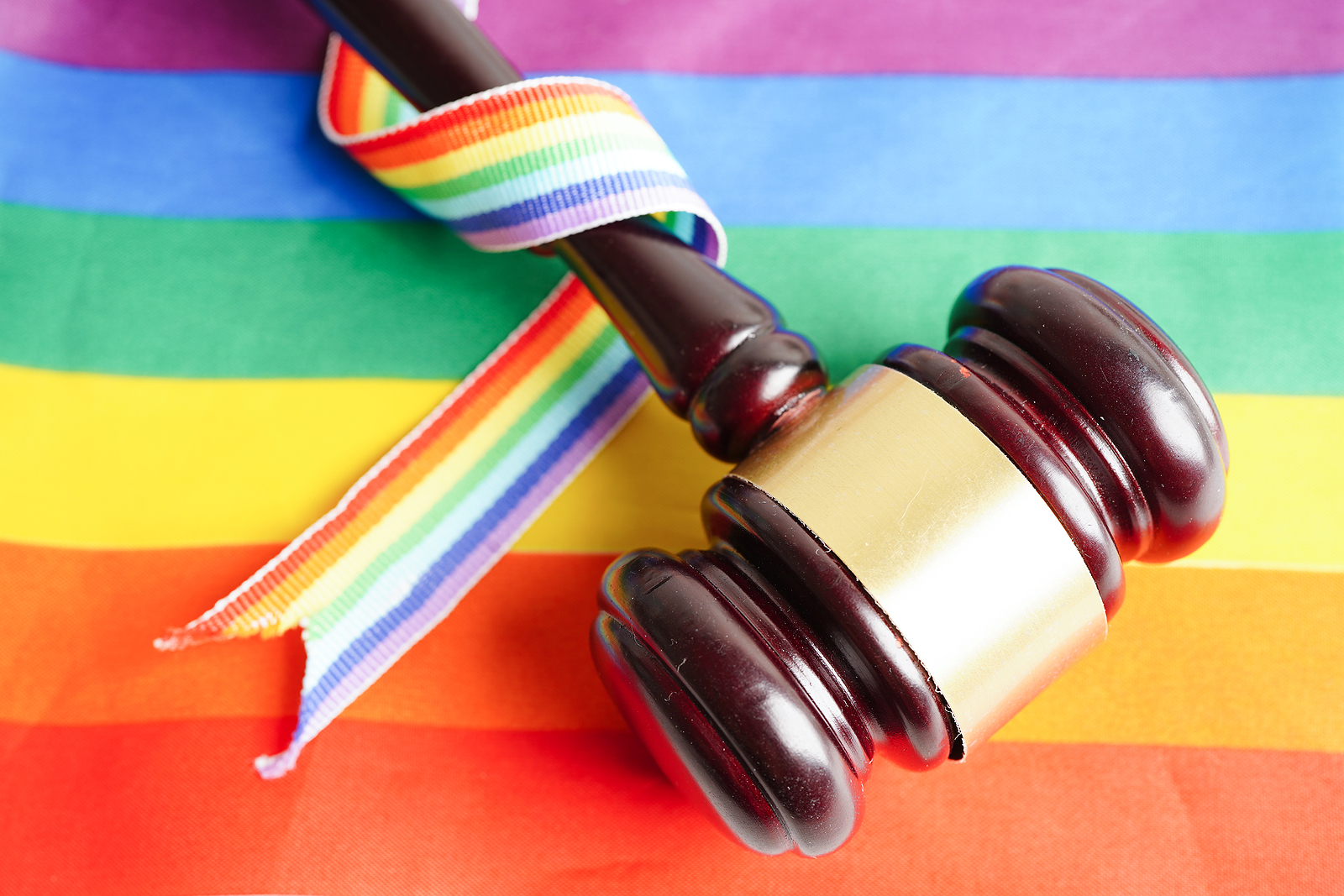
The African American population has suffered horrifically worse atrocities than people living with same-sex attraction in the United States. Before the Civil War they were considered to be personal property with no rights, not even marital. As William Goodell wrote regarding the American Slave Code in 1853:
The slave has no rights. Of course, he or she cannot have the rights of a husband, a wife. The slave is a chattel, and chattels do not marry. ‘The slave is not ranked among sentient beings, but among things;’ and things are not married.
Even after the abolition of slavery, discrimination continued. When Martin Luther King, Jr. marched across the Edmund Pettus Bridge in Selma, he and the marchers were met with tear gas, whips, and billy clubs by police.
So who has suffered more historically – gay and lesbian Americans or African Americans?
However, decades of discrimination, hate crimes, and disparaging language notwithstanding, the mental health of the African American community is better than the general population.
Mental Health in America states, “Overall, mental health conditions occur in Black and African American (B/AA) people in America at about the same or less frequency than in White Americans” (emphasis added). A 2014 study in Frontiers in Psychiatry reports similarly that “blacks have lower lifetime rates of [major depressive disorder] and equivalent or lower rates of 12-month MDD compared to non-Hispanic whites.”
The suicide rate for African Americans has been far lower than that of the white population for decades. The surprisingly low rates of mental health problems should be particularly striking considering how high the poverty rate is among African Americans. In 2021, 19.5 percent of them lived below the poverty level compared with 8.2 percent for the white population.
African Americans are resilient folks.
Compare this with the current gay and lesbian population. A recent Gallup survey indicates that as of 2021, 7.1 percent of the US population identifies as LGBT, while another source indicates there are now over 20 million Americans in the LGBTQ+ category. To put that into perspective, that’s more than two times the size of New York City.
According to the 2020 US Census, “Overall, same-sex married couples had a higher median household income than opposite-sex married couples.” The Census also found that more same-sex couples had at least a bachelor’s degree in comparison with other couples.
Same-sex married couples experienced lower rates of poverty than did opposite-sex married couples. Overall, same-sex married couples in general enjoy higher income, higher educational status, and lower poverty rates than opposite-sex married couples.
In terms of the law, LGB folks have a plethora of legal protections. Twenty-three states plus the District of Columbia have laws prohibiting discrimination based upon sexual orientation in the realms of housing and employment. The US Department of Housing and Urban Development prohibits discrimination on the basis of sexual orientation.
The 2020 Supreme Court decision Bostock v. Clayton County declared that Title VII of the Civil Rights acts includes sexual orientation under workplace protections prohibiting discrimination on the basis of sex.
The 2015 Obergefell v. Hodges Supreme Court decision declared that bans on gay marriage are unconstitutional. In at least 35 states plus DC gay marriage is protected by law or court ruling. With the recently passed The Respect for Marriage Act, gay marriage is triply protected.
Furthermore …
Whenever a gay or lesbian individual is fired, fury erupts in the media. If a business refuses to fly the rainbow flag it faces a public backlash. The American flag can be burned in public, but burning the rainbow flag can result in a prison sentence.
Public disagreement with LGB orthodoxy can get an employee fired. Instances of discrimination, harassment, and firing against individuals who publicly or even privately express disapproval with gay marriage or homoerotic relations are seemingly endless. For a brief list just google these names: Lindsey Barr, Peter Vidala, Kenneth Howell, Atlanta Fire Chief Kevin Cochran, Nelli Parisenkova, Steve and Bridget Tennes, or Jaelene Daniels.
Cancel culture protects persons with same-sex attraction and persecutes heretics.
Add to that the incongruity between cancel culture’s treatment of killers and its treatment of those who say bad words against people with a certain sexual orientation. As Dave Chapelle pointed out regarding American rapper DaBaby:
He’s a wild guy. He once shot a n****r and killed him. In Walmart. Oh, this is true. Google it. …Nothing bad happened to his career. Do you see where I’m going with this? In our country, you can shoot and kill a n****r, but you better not hurt a gay person’s feelings!
But what about higher rates of mental illness among persons with same-sex attraction? Surely this is due to oppression.
Not likely.
First, rates of mental health problems for lesbians, gays and bisexuals have not significantly decreased with increasing societal, legal, and cultural norms protecting such populations. A 2002 study found that “US gay and bisexual males have more than a 3-fold increased risk of ever attempting suicide in comparison with their heterosexual male counterparts.”
But a 2021 study based on data from 2015 to 2019 found that: “After taking demographic factors into account, the researchers found that suicide risk was three to six times greater for lesbian, gay, and bisexual adults than for heterosexual adults across every age group and race/ethnicity category.”
In the years between 2002 and 2019, social acceptance soared. In 2002 support for gay marriage in the United States was a mere 40 percent; in 2019 it had risen to 63 percent.
If increased social acceptance doesn’t help the mental health of the LGBT community, perhaps these intractable problems are not due to “minority stress.”
This isn’t to say that harassment and bullying or family rejection don’t exist. They do and they can be traumatic. But to assume that poor mental health is largely due to societal oppression creates a paralysing victimhood narrative.
Second, other oppressed populations do not have such disproportionately high rates of mental health problems. Contrast the gay population with the Ukrainian population.
Ukrainians are at war with a brutal army. Their livelihoods have been upended, their cities ravaged, and their families are in danger. Many have already fled the country. Those who remain have to cope with freezing temperatures and no heating.
Despite these problems, do we find higher or even equal rates of suicidality among them as we do among the gay and lesbian population? Do we find equal rates of intimate partner violence? Do we find at least equal rates of depression and alcohol use as we do among the gay population?
If not, then poor mental health cannot be attributed only to widespread oppression.
An objector may protest here that LGB individuals have suffered two mass shootings in recent years: one at Pulse in Orlando in 2016 and the other at Club Q in Colorado Springs in 2022. So, they must be classified as an oppressed population.
Such attacks on innocent individuals ought to be condemned. Being gay shouldn’t be a death sentence.
But such events are exceptionally rare, and disproportionately small in comparison with the number of mass shootings targeting African Americans in recent years. The black community not only has suffered from a racist mass shooting in Charleston in 2015 and a racist mass shooting a Buffalo grocery store in 2022, but also from regular rounds of mass shootings every year that aren’t reported. As black author Adam Coleman says, “The elephant in the room is that mass shootings happen all the time in cities across the country—they just happen in poor and low income Black neighborhoods.”
Five people died at Club Q. Ten African Americans died at Tops Friendly Markets. While the shooter at Tops clearly had racist intent, the shooter at Club Q identifies as non-binary, meaning he may very well be part of the transgender community. African Americans suffer more than the gay and lesbian population in terms of mass shootings. Yet they don’t suffer such disproportionate rates of depression or suicides. Not all mental health problems are due to oppression.
Killing gay persons is morally wrong. Mass shootings are murder. But individual and rare instances of horrific acts (e.g. two cases in six years) hardly count as a pattern of widespread oppression.
Persons living with same-sex attraction deserve love and respect. But do they still need to be treated like snowflakes? A population that has higher levels of income, education, favourable Supreme Court decisions, numerous state laws protecting them, a thriving cancel culture, and The Respect for Marriage Act behind them shouldn’t be called “widely oppressed.” Instead, they should be called to love––yes, even to love those who disagree with them.







